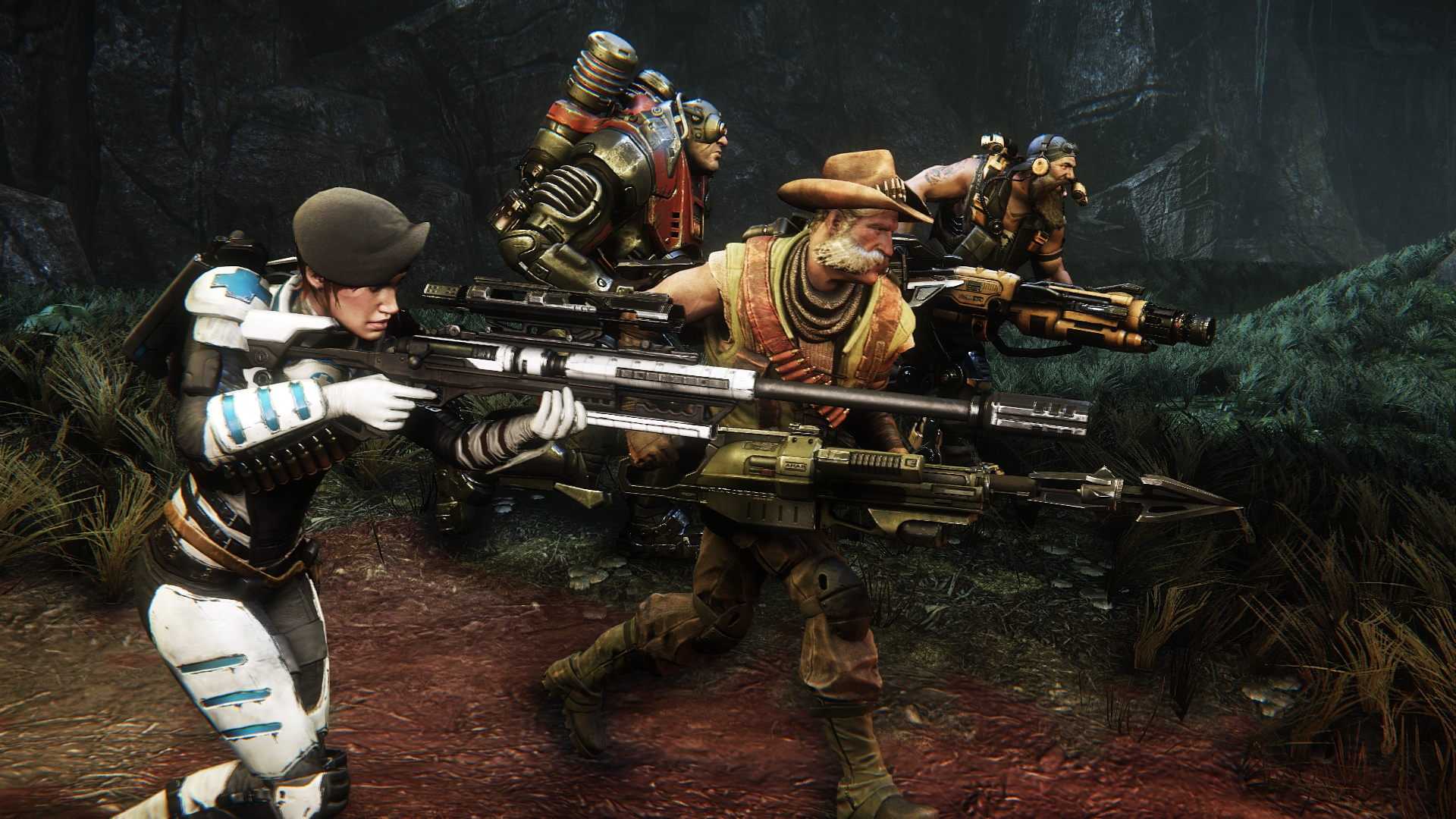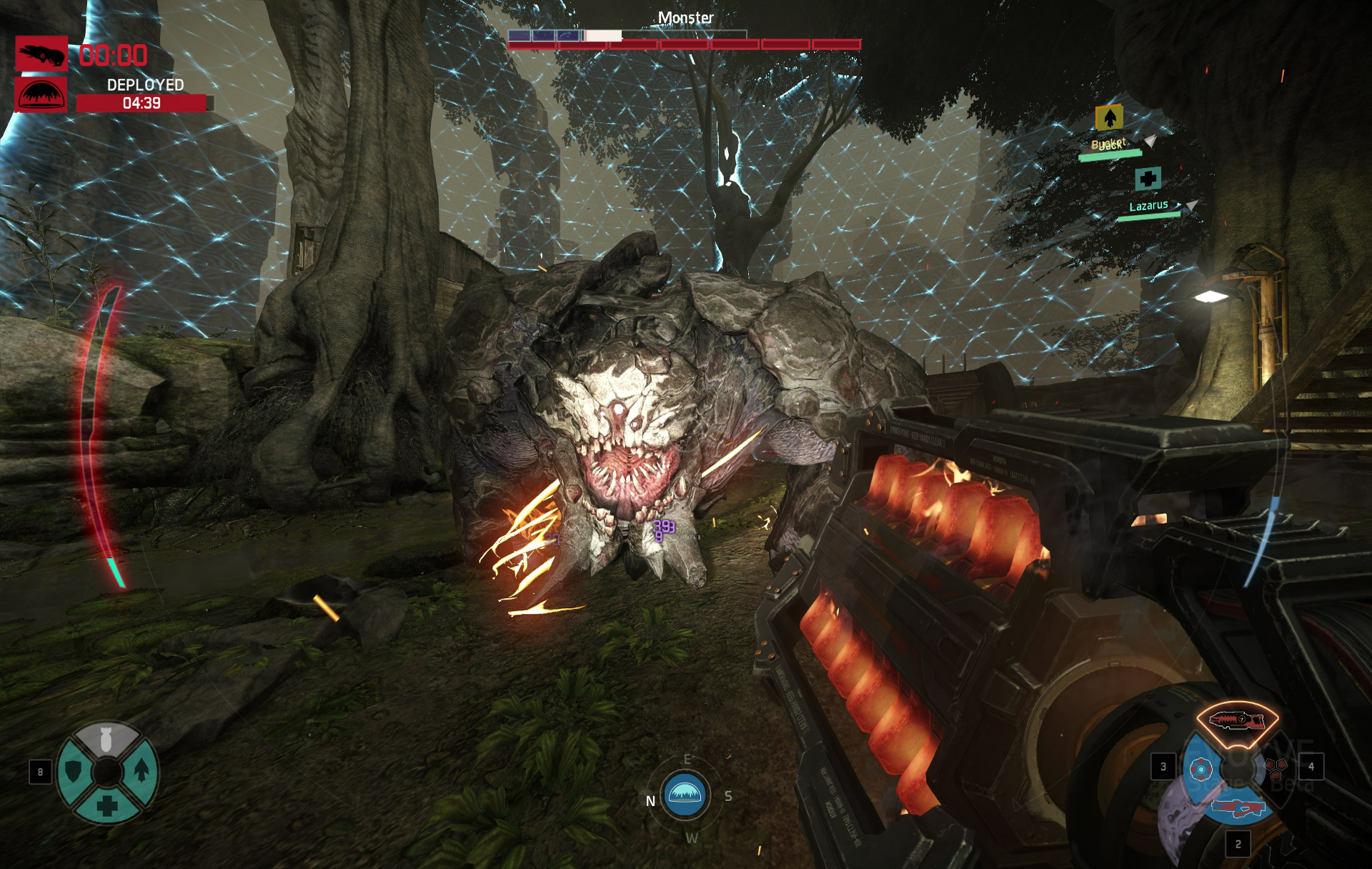Tips for playing Evolve: Stage 2
Whether it's your first time on Shear or you're returning for another go, we can help.

Evolve has been revived as Evolve: Stage 2, a radical reconfiguration of Turtle Rock's asymmetrical shooter. The action is still fast and unpredictable, with a human opponent helming the monster’s brutality against a team of hunters. Best of all, it’s free—open season for new and returning players alike to revisit the old hunting grounds or step into the jungle for the first time.
Whether you’re brushing up on the basics of hunting or tightening up your monster play, the tips in this guide should help.
Hunters
Role call
During a face-off, stick to your job. Your equipment and chosen hunter type—Assault, Support, Trapper, or Medic—defines your playstyle and interaction between comrades and hulking monster. Don’t prioritize dealing damage if you’re the Support; that’s the Assault’s job. As a Medic, healing is your universe. If your arsenal slows or debilitates the monster in some way, use it—you’re likely the only member of your hunting party with the capability to do so. That doesn’t mean you shouldn’t send some punishment in the monster’s direction, but your attacks should be smartly timed during cooldown intervals of your utility abilities. With the exception of the tanky Assault, randomly attacking the monster is almost always less effective than using your tools to help your team.

Power positioning
Underlined, bolded, and circled in red ink in the hunter’s playbook is “never get caught in the open.” Engaging the monster in flat terrain, though obstacle free for crucial jetpack boosts, is an invitation for the exposed hunters to suffer a maneuverable foe who’ll capitalize on superior speed and splash-damage attacks. Grab as much vertical space as you can for valuable protection. Posting non-Assault hunters on outcroppings, cliff faces, rooftops, or any other sort of raised object forces the monster to tilt their view and climb to other targets when they shifts their focus. The added height provides extra oomph to your jetpack drifts when getting out of the monster’s trajectory, and it’s easier to pick out a similarly elevated landing zone while at a higher hover. If you’re the Assault, get into the monster’s face and be a stinging nuisance for as long as you can. Otherwise, jet away and jet up.
Track attack
The monster’s footprints are glowing breadcrumbs to your prize, but resist the urge to mindlessly chase after track trails around the map. You won’t catch up to the faster monster by just following animal carcasses and meandering prints. Instead, head off the monster’s predicted pathway. Spread out (but don’t isolate yourself!) to try and intersect with the monster’s travel direction. Use the minimap as a visual aid for smartly steering your group; if, for example, the only way a monster can go is straight back into your awaiting guns or turn, assume he will turn. Watch out for moments of misdirection: the monster can mask its movements by sneaking or traveling through water to eliminate footprints. The Trapper’s planet scanner ability is a great boon for directing the hunter pack in the general direction of the monster, but be prepared for clever monster players to mentally countdown the scanner’s duration and resume stalking as soon as the scan ends.
Dome diligence
The Mobile Arena is the dome-shaped gauntlet hunters throw down to coerce the monster into an unavoidable duel and prevent escape for a precious few minutes. Any hunter can trigger the arena after getting close enough to the monster, but don’t dome until the moment is advantageous. You’ll want to dome when the monster is on the backfoot, ideally after taking some initial chip damage or has little to no armor to shrug off hits. Good dome fights are dictated by the surrounding terrain it encircles—avoid dangerously close-range map sections such as caves or tunnels and go for rocky crags or ledge-filled overlooks for extra movement space and natural cover. Make sure your team is close before engaging the dome; though fellow hunters can enter the dome from the outside, you don’t want to initiate a challenge with no one at your side for the first vital seconds.

The Medic makes a team
A successful hunting expedition needs a successful Medic. Choosing to be the Medic requires mastery of dodging and positioning, as you’ll need to constantly evade the monster’s onslaught—which will certainly be focused on you above all others—while monitoring jetpack juice, tracking ability cooldowns, and healing wounded teammates. As a different hunter role, you’ll sometimes need to double as snap bodyguard for your Medic and absorb as much incoming damage as you can withstand. If the Medic falls, your posse will likely topple soon afterwards.
The biggest gaming news, reviews and hardware deals
Keep up to date with the most important stories and the best deals, as picked by the PC Gamer team.
Val is a good starter choice for a traditionally kitted doc; her medgun offers no-frills single-target healing while her scoped tranquilizer rifle emphasizes distance to land effective shots. For something more offbeat, give Lazarus a try. Beyond a decently restorative healing burst, he lacks direct healing. His true speciality lies with his Lazarus device and personal cloak, the latter a defensive bonus for using the latter to quickly revive dead teammates.
On the next page, essential tips for Monsters.
Omri Petitte is a former PC Gamer associate editor and long-time freelance writer covering news and reviews. If you spot his name, it probably means you're reading about some kind of first-person shooter. Why yes, he would like to talk to you about Battlefield. Do you have a few days?


